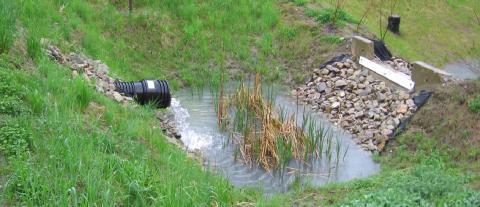Sustainability on Campus: Stormwater Management
The University of New Hampshire has a rich history of preserving our local environment and ensuring human dignity, prioritizing sustainability initiatives that ensure local resources are available for future generations. The goals of these sustainability initiatives vary widely, from reducing waste on campus and implementing clean sources of energy production to meeting students’ basic needs such as food security and affordable education.
During my internship through the UNH Sustainability Institute, I’ve been involved with the MS4 stormwater permit, which limits the number of byproducts in our campus’ discharged water. In order to get a better idea of this permit and how UNH addresses stormwater, I spoke to David Bowley and Will Powers from UNH Energy and Utilities.

Will and Dave are on the UNH Ecosystem Task Force and work with the universities’ Stormwater Treatment Structures (STS), pictured on the right. The STS’s goal is to protect downstream resources, like Great Bay, from sediments and pollutants that may be emitted from UNH. UNH has a number of these structures, which can vary from pervious asphalt that absorbs water, to rain gardens that collect stormwater and provide for local plant and animal species.
One of the biggest concerns regarding stormwater management is the amount of nitrogen in the water. If too much nitrogen gets into local water systems, the number of algae will increase, in turn decreasing oxygen levels and creating a positive feedback loop that encourages further algae growth. This would be devastating for water bodies in Durham, but even more so for downstream ecologically sensitive areas like Great Bay.
If this sounds important, it’s because it is. The Seacoast region of New Hampshire is home to many sensitive areas that need our help to ensure they are around for future generations. When asked what actions UNH students, faculty, and staff can take to help, Will and Dave stated that picking up after yourself is a great way to start. In many areas, STS’s tend to accumulate trash and small debris that can affect the structure’s ability to collect and filter water. When inspecting STS’s on campus for debris, the amount of trash found is far less than what you would expect for a campus as large as UNH’s, which speaks to the community’s concern for our environment.
The campus’ stormwater structures ensure that UNH’s sustainability commitments are met in order to serve current and future generations of Wildcats and surrounding communities. In Fall 2021, UNH achieved a renewed STARS Platinum rating from the Association for the Advancement of Sustainability in Higher Education (AASHE), one of only ten schools in the nation to achieve this highest level of sustainability performance among colleges and universities. UNH’s Platinum rating was made possible through long-term, concerted, and university-wide effort that engaged faculty, staff, and students.